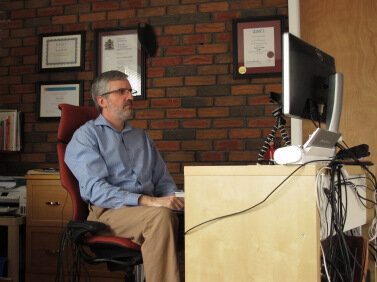So Far and Yet so Near - Video Therapy
The whole world has changed.
How often have we been able to say that without being guilty of gross exaggeration?
I have been very fortunate to be able to continue my work in a way that doesn’t expose me and my clients to the COVID-19 virus. Secure video conferencing services for health care have been available for our use.
There has been a great deal of change in my clientele. Many people needed to cut therapy short abruptly in March due to work requirements, their children being home from school or because they simply weren’t comfortable with video therapy. Some clients continued and others have started.
The experience has been that video therapy works. That does not mean that it works just well enough or that it will do until we can get back to “normal”. (That word could be the subject of a whole blog post on its own.) It works. Full stop.
I’ve been privileged to be able to do some amazing work with clients during this time. There has been great need but at the same time people have been able to show a great capacity for vulnerability and empathy. These are key building blocks in therapy – particularly relationship therapy.
Although I am distant from my clients and working with their images and voices, there is a very real closeness that comes with video therapy. I enter their space more than they enter mine. There’s a great trust in that and for many clients there is a comfort that comes with being in their own space.
There is much speculation right now about what sort of longer-term change will come as a result of this pandemic. One thing I’m pretty confident of is that in my profession, video therapy is going to remain a more common option, even when it is no longer a necessity.
We now find ourselves at a sort of in-between stage where businesses are gradually being allowed to re-open. Phase one of the Province of Ontario’s re-opening plan includes “in-person counselling, including psychology and addictions counselling.” At the same time, my provincial regulatory college has sent out a bulletin which states, “in cases where you have the option of providing e-therapy or in-person therapy, we advise that you still choose e-therapy”.
How do we make sense of in-person counselling appearing to both be opened up and kept shut down simultaneously? Part of the reality in our society is that not everyone has access to the technology and living arrangements required to make video counselling viable. Those people need access to health care just like everyone else. Community mental health and addiction clinics are going to have some significant challenges, finding a way to provided needed care to some of the most vulnerable in our society.
If your circumstances won’t allow for video therapy, please be in touch to discuss the situation. If video therapy is an option, I will ask that we continue to take advantage of the ability to do our work while staying safe from COVID-19.
Video therapy has been very comfortable for some. I know that for some of you the idea takes you far outside your comfort zone. If that is the case for you and you’ve been waiting for in-person counselling to resume, I will ask you to consider how many people have been taken outside their comfort zone for a wide range of reasons during this pandemic. Please give me a phone call so that we can discuss video counselling and your reservations about it.
Working together, building stronger relationships of all kinds, we can get through this time.
